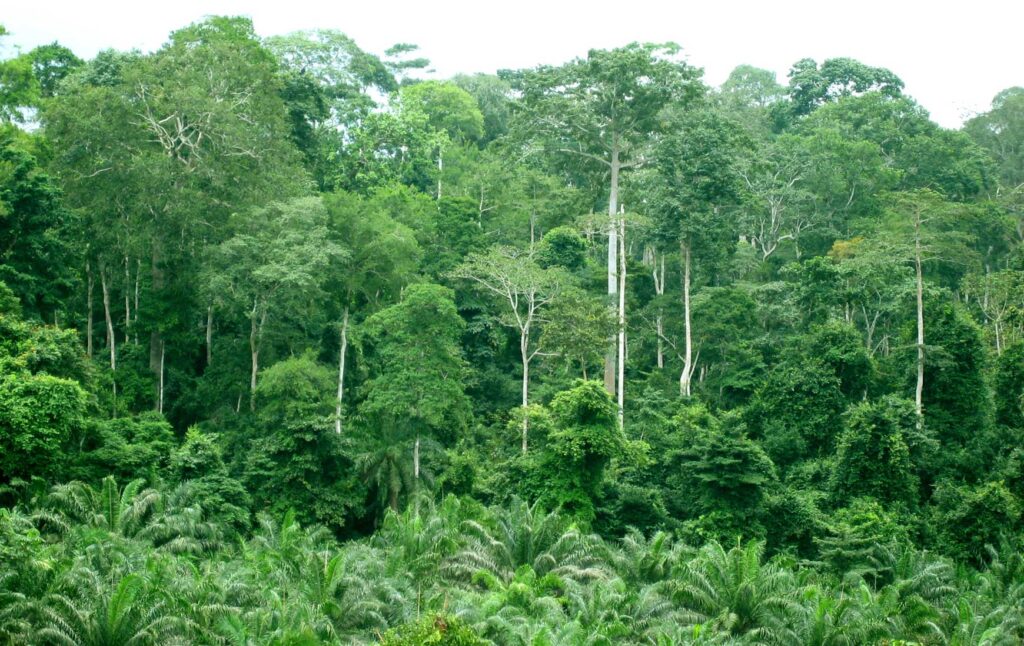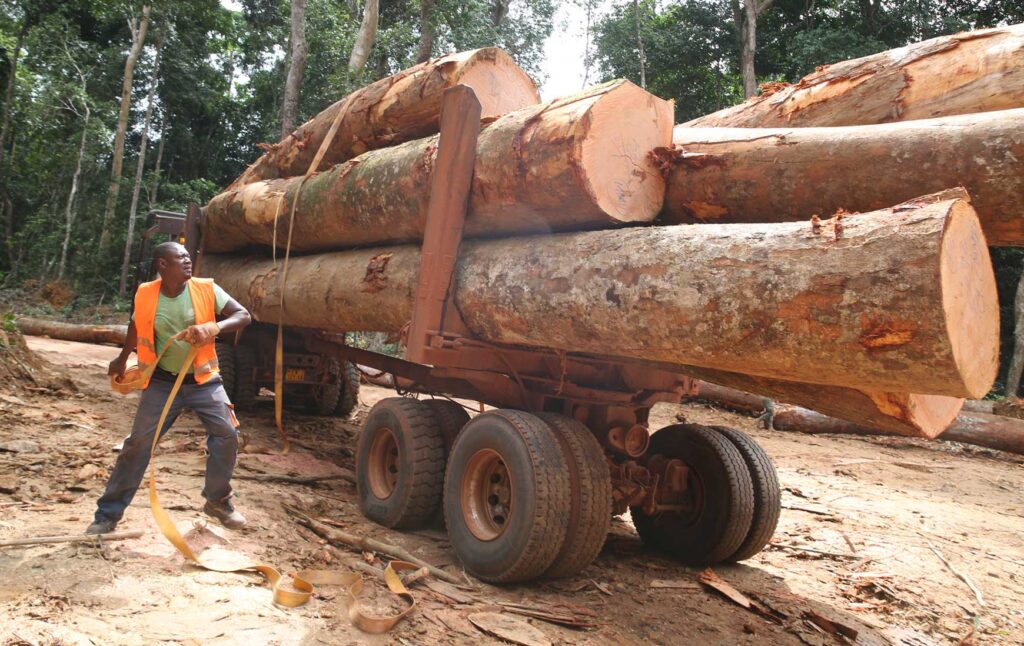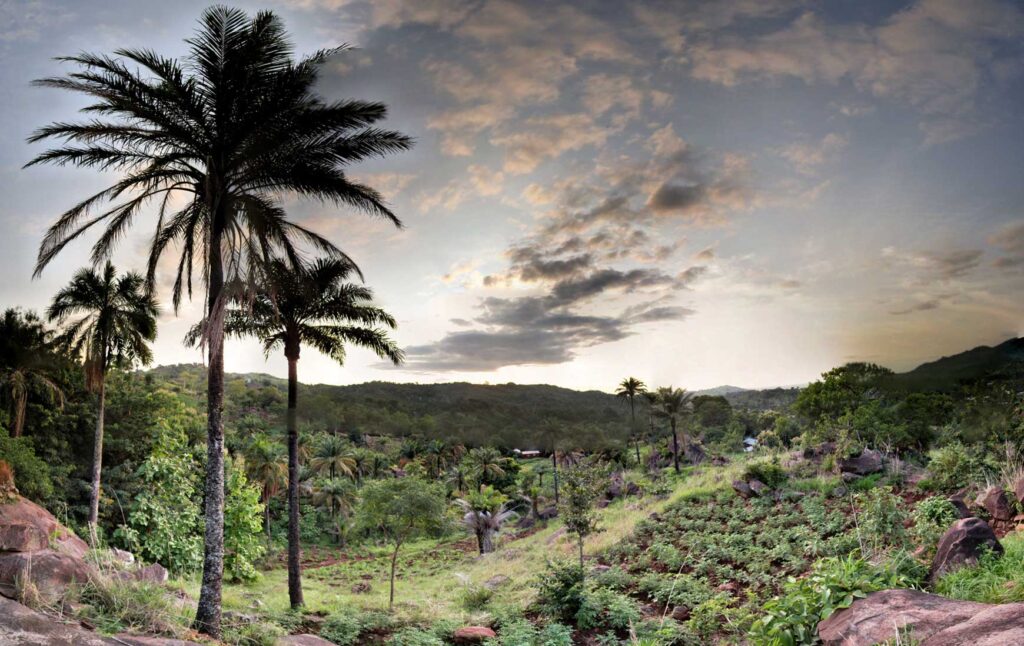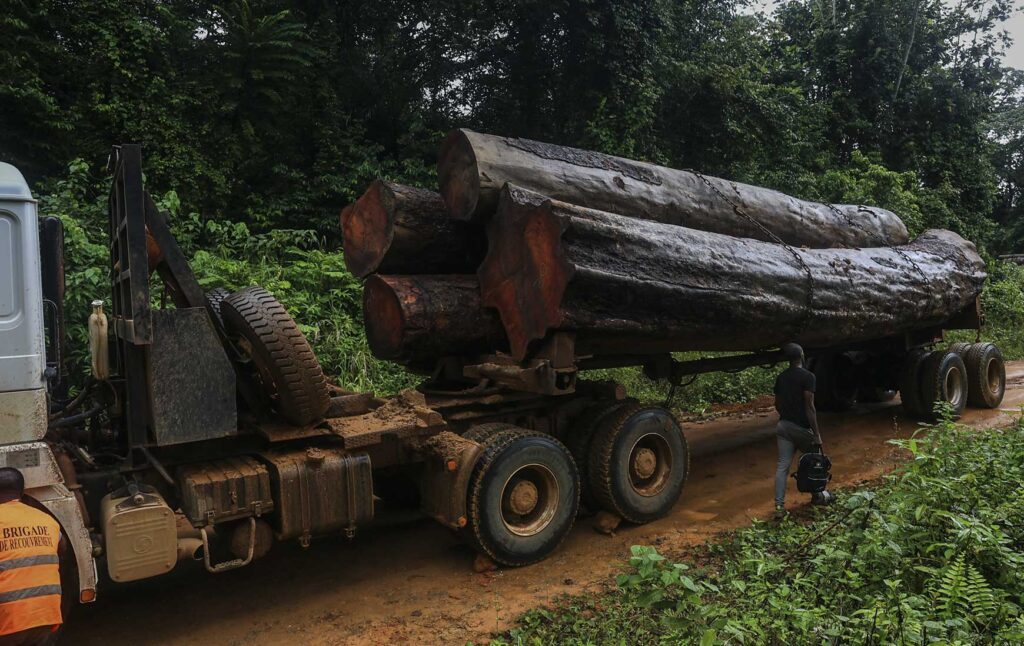Kpeté-Béna is a small town in Togo near the border with Ghana, in the prefecture of Wawa, about 200 km from the capital, Lomé. The town is also a transport hub for smugglers moving illegally cut timber from Ghana into the country for onward delivery to Asian markets, specifically China and India.
Large loads of timber of different species, notably rosewood, are moved across the border at night; illegal logging is carried out in numerous forest communities in Ghana’s Oti region. According to the Environmental Investigation Agency, wood from about six million Ghanaian rosewood trees has been imported by China since 2012, despite an export ban.
Alphonse Mensah is a member of a smuggling group of young Togolese who take delivery of consignments of illegally cut timber from Ghana. “I’ve been doing this job for a while now,” he told Africa in Fact. “During the night, timber from Ghana arrives, and we hide the stocks in the bush while waiting for the transporters to come and reload them to the final destination.”
Illegal logging took off in earnest in West Africa in the early 2000s with the arrival of Chinese traffickers, fronting as legitimate businessmen, in search of new sources of precious woods in a bid to service strong demand from their local markets. In 2011, the pressure on this natural resource increased after China, the leading importer of rosewood (Pterocarpus erinaceus), commonly called “wood of vene” in Senegal and “kosso” in Nigeria, decided to prospect in West African countries to obtain supplies.

Despite strengthening international regulations in the timber sector, cross-border illegal logging keeps a grip on West African countries. Those most affected are Mali, Senegal, Nigeria, Guinea-Bissau, Ivory Coast, Gambia, and Ghana. In the region, poverty and corruption allow the trade to flourish despite efforts to fight it.
The damage is profound. African countries lose $17 billion each year due to illegal logging, which causes widespread environmental degradation and the loss of livelihoods. According to Séna Alouka, the chairman of the pan-African environmental organisation, Young Volunteers for the Environment (JVE), which works in some 15 countries across the continent, the damage is both environmental and economic.
“Illegal logging leads to a reduction in land fertility and soil productivity, leading to desertification, and we know that the populations of these forest areas make a living from agriculture,” he told Africa in Fact. “This situation also leads to a reduction in grazing areas for livestock, which are forced to feed in the fields, leading to conflicts between herdsmen and farmers.” Alouka said the impact of illegal exploitation of forest resources was also leading to the disappearance of certain plant species that were important for maintaining biodiversity. He estimates that Togo, for example, loses between 16,000 and 20,000 hectares of forest each year due to deforestation.
In Touba and Katack, two Senegalese villages located in the Narang, close to the border between the country and Gambia, the local communities bitterly lament the disappearance of hectares of forest. Lamine Gassama, who at one stage was an illegal logger himself, bemoaned the degradation but told Africa in Fact: “Poverty was the main cause because I wanted to earn enough money to cultivate my field as soon as possible; the cutting was done at night, and there were transporters who came to collect the stock.”

“Rosewood traffickers plundered almost everything in the forests of this area of the country, even cutting other species like neem (a member of the mahogany family),” Senegal’s former environment minister Haidar el Ali told Africa in Fact. “They have now moved to the east around the departments of Kolda and Vélingara; from there, traffickers transport their stocks of wood to Mali via the Senegal River.”
Since 2017, countries in the sub-region have been forced by the Convention on the International Endangered Species of Wild Fauna and Flora (CITES) to strengthen their legal frameworks to protect some endangered plant species, including rosewood. To discourage illegal loggers, some countries have also imposed moratoriums on the exploitation of certain forest resources, including timber. Others, including Togo, have banned the export of timber since 2022. Nevertheless, the illegal timber trade continues, with traffickers using new tactics such as turning logs into sawn timber, which is easy to conceal from law enforcement bodies. For the time being, some countries, including Ghana, have developed wood identification systems to help law enforcement identify restricted or banned species that may be concealed in large quantities of logs or saw-timber.
As mentioned earlier, several factors favour the illegal logging industry. These include the lack of governance in the management of forest resources and prevailing corruption and cronyism, as well as coercive force at all levels.
Mary Awelana Addah, Executive Director of the Ghana Integrity Initiative (GII), the local chapter of Transparency International, told Africa in Fact that illegal loggers benefit from complicity within the departments responsible for enforcing the laws.

“Politics, unfortunately, gets involved in the fight against illegal loggers in some West African countries to the point that influential figures protect them,” she said.
A row erupted in Ghana in 2019, for example, when Helena Huang, also known as Queen Rosewood, was arrested only to be released and finally extradited to China instead of being prosecuted for rosewood trafficking.
“Corruption is the main factor favouring illegal logging in Ghana and other countries across the sub-region,” Addah insists. “Some corrupt elements at the departments supposed to be involved in the management of our forest resources are working in connivance with illegal loggers. Sometimes, we have collusion happening; security agents who are supposed to fight against the phenomenon allow people to get away with what they should not.”
Environmentalist Alouka believes that binding agreements against the importation of endangered woods also need to be concluded with destination countries: “There is a need to reach an agreement with importing countries on the types of wood they allow into their territories, like the one with the European Union banning forest products, which cause deforestation in Africa. We all know that our wood goes to China, Turkey, etc. So, we just need to have a win-win discussion with these states.”
Today, many actors involved in the fight against illegal logging are also advocating cooperation between the countries of the sub-region through the establishment of an interdependent structure. They believe that the opacity of the current structures in each country is an obstacle to the exchange of necessary information.

According to reliable sources, for example, cooperation between Togolese and Malian forest resource management services led to the seizure of a large cargo estimated at more than 500 containers of timber from Mali and Sierra Leone at the autonomous port of Lomé in 2022.
The Togolese navy also last year refused a request for transhipment from a vessel carrying timber from Guinea-Bissau. These actions illustrate how countries in the region are keen to put an end to illegal logging. However, awareness among the authorities of these countries must also be reflected in severe criminal sanctions to discourage traffickers and their accomplices in public office. The establishment of a harmonised and efficient cargo tracing system to avoid customs fraud is also recommended.
Some experts further recommend the immediate inclusion of effective public transparency mechanisms in the timber sector to ensure accountability, with the participation of civil society organisations in various countries across West Africa, as well as a monitoring body fully independent of departments in charge of forest resource management or forest commissions. For the moment, the other channels available to states to combat illegal logging remain awareness-raising campaigns and the establishment of income-generating but environmentally friendly activities in forest regions across West Africa.

Blame Ekoué is the Togo correspondent for the BBC and for Paris-based media house, ANA. He has also reported for Associated Press and Radio France International. He holds a BA in Communications from the Leader Institute in Lomé. Formerly deputy editor of the West Africa Revue, he has been a contributor to the Lome-based Business and Finance magazine since 2015.



